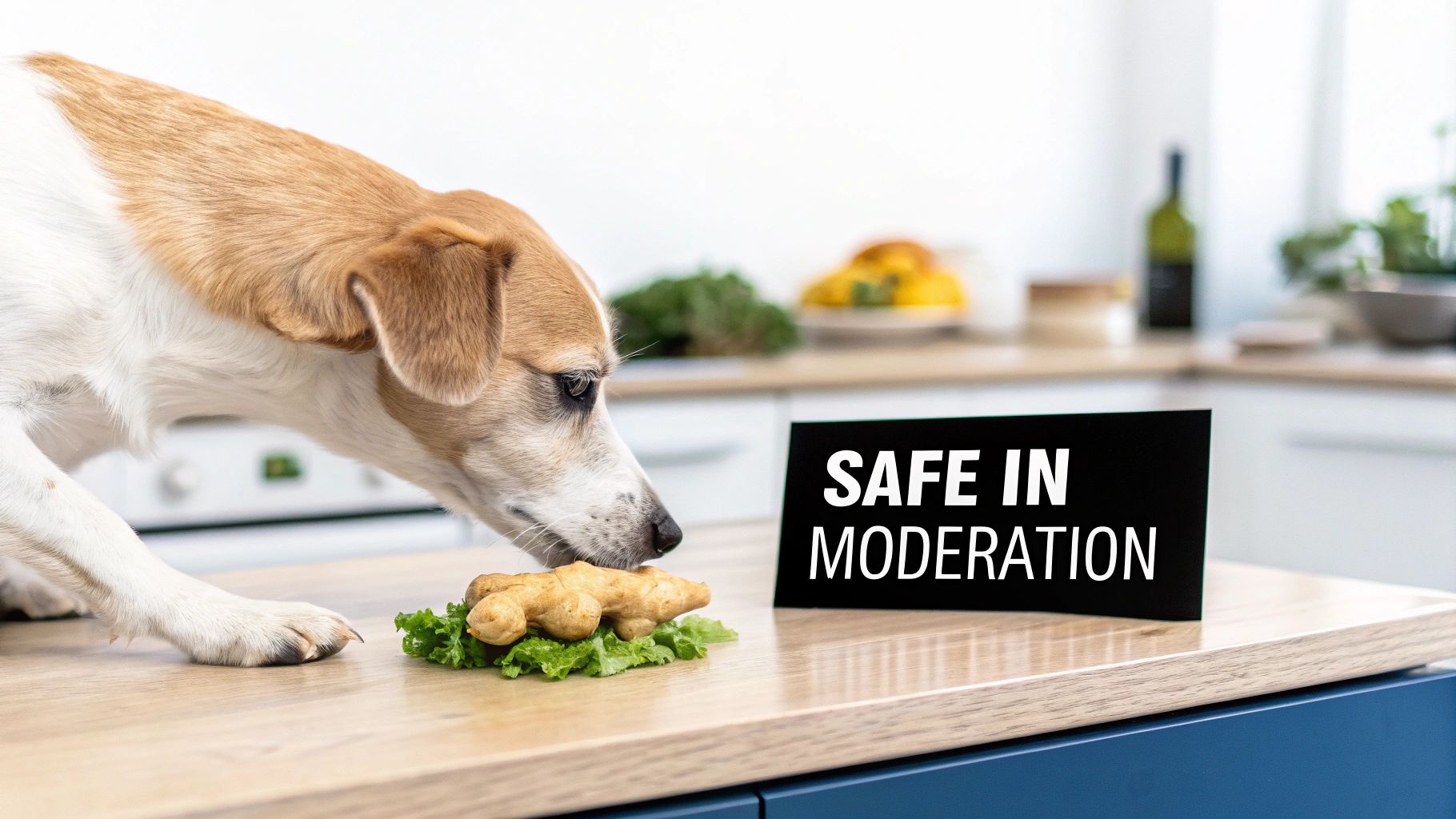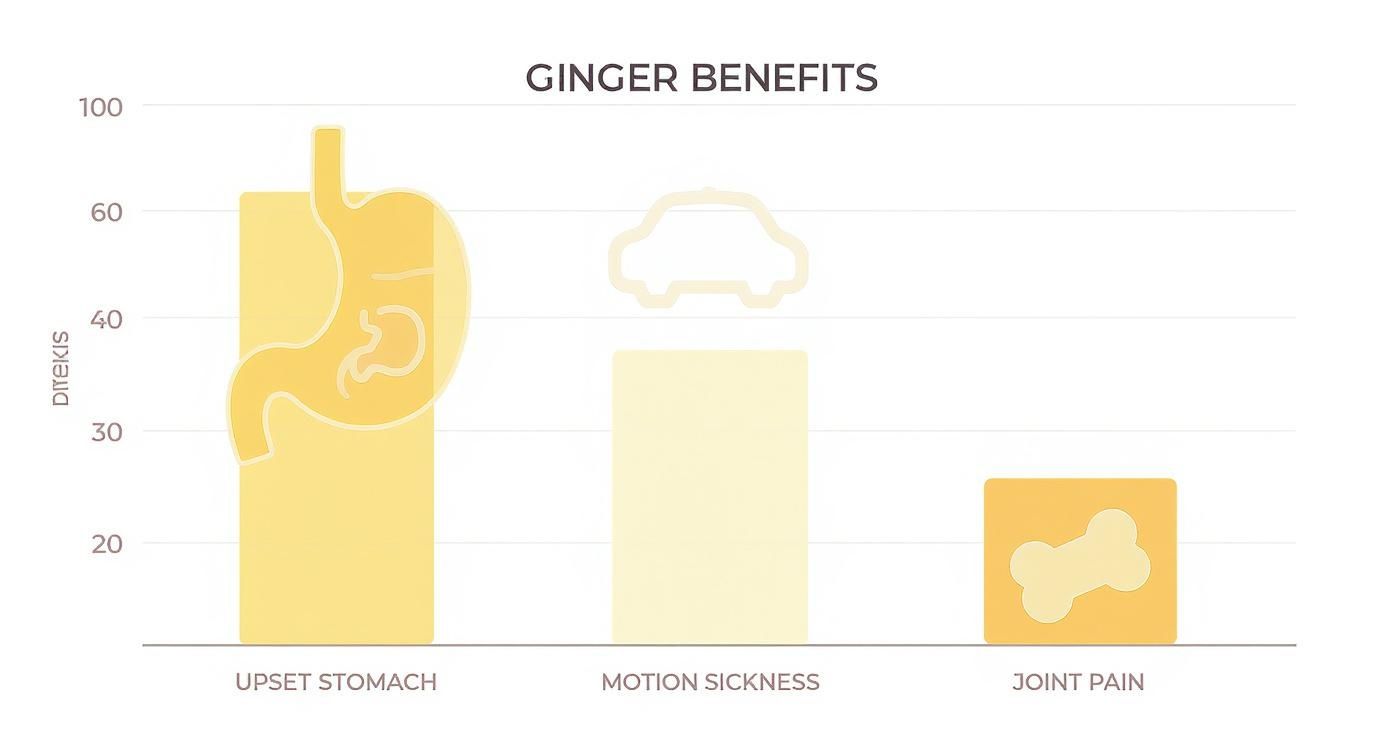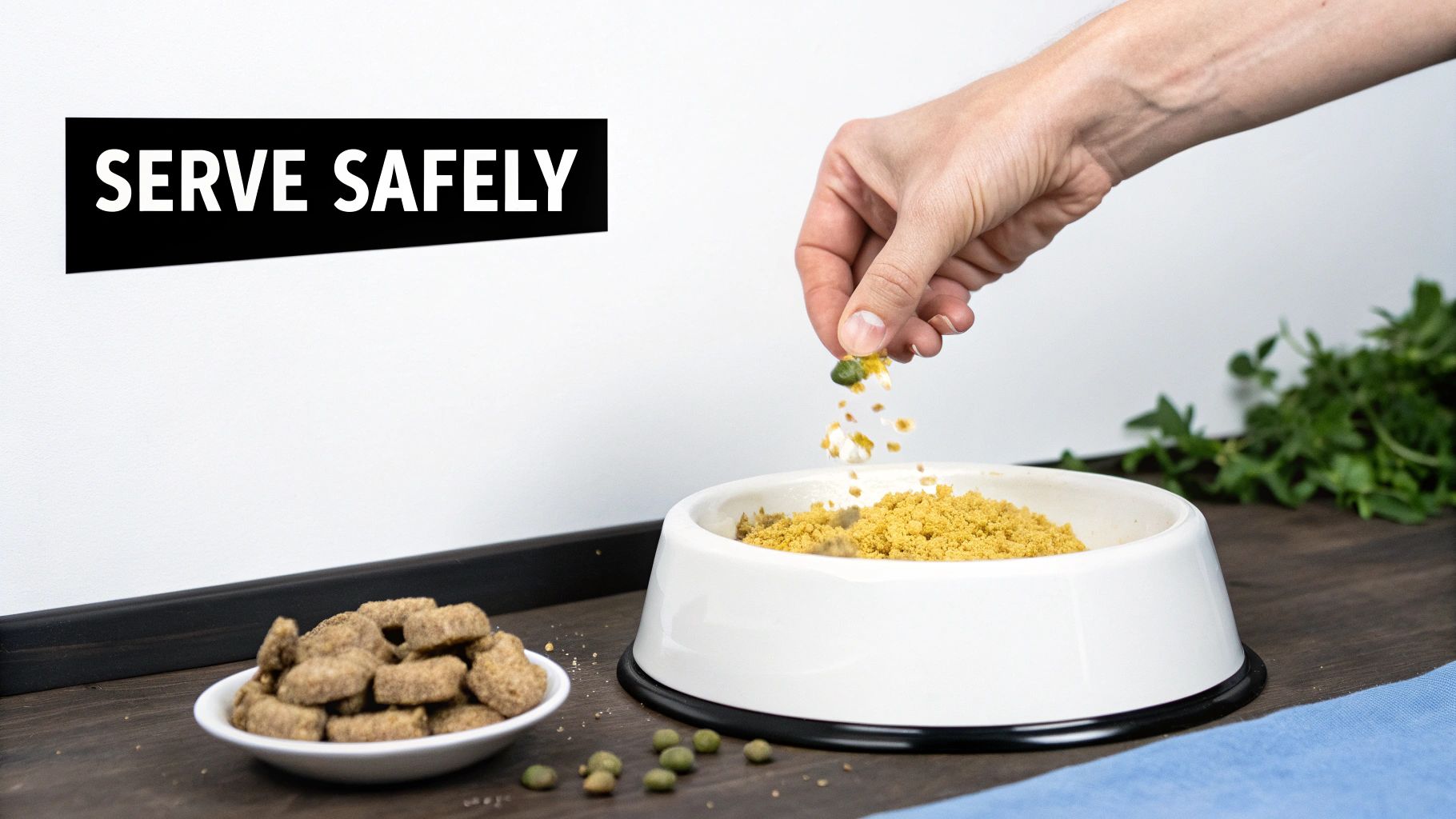
Can dogs eat ginger: Safe Guide for Pets
Yes, dogs can absolutely eat ginger. When prepared correctly and given in small amounts, this common kitchen spice can be a fantastic natural boost for your dog's health, helping with everything from car sickness to stiff joints.
The trick is knowing how to do it safely. Think of ginger as a supplement, not a treat.
The Quick Guide to Ginger for Your Dog

You’ve probably seen ginger pop up in discussions among dog owners, and there’s a good reason for the buzz. This knobby root is packed with powerful compounds that can genuinely support your dog’s well-being.
Its use in wellness is hardly new; ginger has been a staple in traditional medicine for centuries. That popularity has naturally spilled over into the pet world. In a 2018 survey, it was found that about 38% of dog owners use natural supplements for their pets, and ginger is often a top pick for tackling motion sickness and digestive issues. You can read more about what experts say on ginger's safety for dogs.
For a quick overview, here's a simple breakdown of the most important things to know.
Ginger for Dogs At a Glance
| Aspect | Summary |
|---|---|
| Is it safe? | Yes, in small, controlled amounts. Fresh or powdered forms are best. |
| Main Benefits | Excellent for nausea, motion sickness, and digestive upset. It also has anti-inflammatory properties that can help with joint pain. |
| Key Warning | Too much can cause stomach upset, gas, or heartburn. Always start with a tiny amount. |
| Who Should Avoid It? | Dogs with bleeding disorders, those on blood thinners, or dogs scheduled for surgery. Use with caution in pregnant or diabetic dogs. |
This table covers the basics, but the real value comes from understanding the why behind these points.
What Makes Ginger a Good Choice?
So, what's the magic behind this humble root? It all comes down to its active compounds, especially one called gingerol. This is the powerhouse responsible for most of ginger's well-known medicinal properties.
When you give your dog a small, appropriate amount, ginger can:
- Soothe an upset stomach: It’s famous for calming nausea and indigestion.
- Reduce inflammation: This makes it a great natural aid for dogs with joint discomfort or arthritis.
- Provide antioxidants: These compounds help protect your dog’s body from cellular damage.
The most important thing to remember is that a little ginger goes a very long way. It's a powerful supplement, not a food group. Overdoing it can backfire and cause the very stomach issues you’re trying to prevent.
This guide will walk you through everything you need to know, from the exact dosages for your dog’s size to which forms of ginger are safe and which you must avoid. Let's start by digging into the specific benefits in more detail.
Unpacking Ginger's Health Benefits for Dogs
Ginger is so much more than a zesty spice; it's practically a natural pharmacy packed into a root, and it can do some real good for your dog. The magic behind it all comes down to a potent compound called gingerol. Think of gingerol as the active ingredient—it's what gives ginger its powerful anti-inflammatory and antioxidant punch.
When you give your dog a little bit of ginger, these natural compounds get to work in their system. We're not just talking about old wives' tales here; these are real, tangible benefits that can make a difference in your dog's comfort and daily life.
Soothing Upset Stomachs and Nausea
One of ginger's most well-known talents is its incredible ability to settle a queasy stomach. It's a game-changer for dogs who get carsick. The gingerol helps relax the muscles in the stomach lining, which can dial down that nauseous feeling and stop vomiting before it starts.
This makes ginger a fantastic, natural go-to before a road trip. A small dose before you leave can transform a stressful, drool-filled car ride into a calm and comfortable journey. For a deeper look at similar natural remedies, you can explore the ginger and turmeric shots benefits.
Ginger acts like a soothing balm for the digestive tract. Research has shown it can be effective in reducing nausea, even in dogs undergoing treatments like chemotherapy that often cause digestive distress.
This calming effect isn't just for motion sickness, either. If your dog gets the occasional bout of gas or bloating, a tiny bit of ginger can help get their digestive system back on track and ease their discomfort.
A Natural Anti-Inflammatory for Joint Support
Ginger’s benefits go well beyond the gut. Its anti-inflammatory properties are a huge help for senior dogs or breeds prone to joint problems like arthritis. Chronic inflammation is the culprit behind the pain and stiffness that can make just getting around a painful chore for our older friends.
Think of that inflammation as a constant, low-level fire simmering in your dog's joints. Gingerol helps to cool that fire down. By reducing that inflammation, ginger can provide natural pain relief and help your dog move more easily.
While it’s no substitute for medication prescribed by your vet, it’s an excellent complementary therapy. Many dog owners find that adding a little ginger to their dog’s routine helps them seem more comfortable and spry.
Here's how ginger's anti-inflammatory power helps:
- Reduces Joint Pain: It can help take the edge off the discomfort from arthritis and other inflammatory conditions.
- Improves Mobility: When joints feel better, dogs can move more freely, whether it's on a walk or just getting up from a nap.
- Provides Antioxidant Support: It helps fight off cellular damage from oxidative stress, a key factor in aging and chronic disease.
It's easy to see why so many people are turning to this simple root to help their dogs feel their best. It’s a gentle, natural way to tackle some of the most common health issues our dogs face.
Finding the Right Ginger Dosage for Your Dog
When it comes to giving your dog ginger, the mantra is simple: start low and go slow. You wouldn't introduce a whole new meal plan overnight, and the same principle applies here. Giving their system a chance to acclimate is key.
Even with something as beneficial as ginger, too much too soon can backfire, leading to the very stomach upset you're trying to prevent. A tiny pinch is all you need to begin. This lets you watch for any negative reactions before moving forward. If all goes well after a few days, you can slowly work your way up to the recommended amount for your dog's size. This careful, gradual approach is the safest way to go.
Recommended Daily Ginger Dosage for Dogs by Weight
Every dog is different, of course, but weight-based guidelines are a fantastic, safe place to start. Before you begin, though, it's always a smart move to have a quick chat with your vet. They know your dog's health history and can give you the most personalized advice.
For most dogs, here's a good starting point for daily dosages. The goal is always to find the smallest amount that gives your dog the benefits they need—more isn't necessarily better.
| Dog Weight | Fresh Grated Ginger (daily) | Powdered Ginger (daily) |
|---|---|---|
| Toy Breeds (under 10 lbs) | Up to ⅛ teaspoon | Tiny pinch |
| Small Dogs (10-35 lbs) | Up to ¼ teaspoon | Small pinch |
| Medium to Large Dogs (35-75 lbs) | Up to ½ teaspoon | Up to ¼ teaspoon |
| Giant Breeds (over 75 lbs) | Up to ¾ teaspoon | Up to ½ teaspoon |
Remember, consistency is far more effective than giving a large, infrequent dose. A little bit each day goes a long way.
This chart highlights some of the most common reasons pet parents reach for ginger, from calming a queasy tummy on car rides to supporting aging joints.

As you can see, ginger is a powerhouse root for tackling everyday dog issues. Nailing the dosage is what unlocks its full potential safely.
Keep in mind that the form matters, too. Fresh ginger is less concentrated than the dried, powdered version, so you'll need to adjust the amount accordingly. If your pup has never had ginger before, starting with fresh is usually a gentler introduction for their digestive system.
For those looking for a well-rounded approach to gut health, a high-quality dog digestive supplement can be a great option, as it often includes carefully measured ingredients like ginger alongside other beneficial components. In the end, your best tools are always careful observation and guidance from your vet.
How to Prepare and Serve Ginger to Your Dog

So, you've figured out the right dose. The next step is getting that ginger into your dog's diet safely and effectively. The best approach is always the simplest one: stick to pure, unadulterated ginger.
Your two best friends here are fresh ginger root and plain, unsweetened ginger powder. For fresh ginger, just peel the skin off and mince or grate it into tiny pieces. This way, you can easily mix it into their food, ensuring they don't get a surprisingly spicy bite. Powdered ginger is even easier—just measure the correct amount and sprinkle it right over their kibble.
Fresh Ginger vs Powdered Ginger
While both fresh and powdered ginger are great options, there's a slight difference to keep in mind. Fresh ginger is a bit less concentrated, which makes it a fantastic starting point if your dog has never had it before. Powdered ginger, on the other hand, packs more of a punch, so you'll need to use a smaller amount to get the same benefits.
Either way, think of it as a seasoning for their meal, not a separate treat. The goal is to blend it in so they hardly notice it's there.
Human Ginger Products to Steer Clear Of
This is a big one. It's so easy to assume a "ginger" product is fine, but many human foods containing this root are extremely dangerous for dogs. It’s absolutely critical to know what to keep out of their reach.
- Ginger Snaps & Gingerbread: These are packed with sugar, fats, and oils that can upset your dog's stomach or even lead to pancreatitis. Worse yet, they often contain other spices like nutmeg, which is toxic to dogs.
- Pickled Ginger: That pink stuff you get with sushi? It’s a definite no. It's loaded with salt and vinegar, which can easily cause digestive chaos.
- Ginger Ale & Ginger Beer: These drinks are a minefield. They’re either full of sugar or, more dangerously, artificial sweeteners like xylitol. Xylitol is highly poisonous to dogs and can be fatal even in small amounts.
- Candied or Crystallized Ginger: This is basically just ginger coated in a mountain of sugar. It offers zero health benefits and can contribute to dental issues and weight gain.
Many of these processed foods carry real risks. Some reports show that 30% of dog owners who gave their pets ginger snaps saw mild digestive upset, while 5% reported more serious symptoms like vomiting. You can learn more about why human ginger snacks are unsuitable for dogs.
A simple rule to live by: If it wasn't made specifically for your dog, it's safest to avoid it. Sticking with pure ginger ensures they get all the good stuff with none of the bad.
A Simple Homemade Ginger Dog Treat Recipe
Want a fun and surefire way to give your dog ginger? Bake it into their treats yourself! This gives you complete control over every single ingredient. Here’s an easy recipe to get you going.
- Get Your Ingredients: You’ll need 1 cup of whole wheat flour, ¼ cup of unsweetened applesauce, 1 egg, and the correct dose of freshly grated ginger for your dog's weight.
- Mix It Up: Combine everything in a bowl until a nice dough forms. Give it a quick knead on a floured countertop.
- Roll and Cut: Roll the dough out until it’s about ¼-inch thick, then use cookie cutters to make some fun shapes.
- Time to Bake: Place the treats on a baking sheet and pop them in the oven at 350°F (175°C) for around 20 minutes, or until they're golden brown. Make sure they cool down completely before you offer one to your eager pup.
Making your own treats is a fantastic way to incorporate healthy ingredients into your dog's diet. If you’re looking for more ideas, there are tons of healthy dog treat recipes out there to explore.
Understanding the Risks and Side Effects
As great as ginger can be, it's a powerful plant. And with great power comes the need for a little caution. It’s not a treat you can just hand out freely. Knowing the potential risks is every bit as important as knowing the benefits, ensuring you're only helping, not harming, your canine companion.
The most common mistake owners make is giving too much, too soon. A dog's digestive system can get overwhelmed by a large dose, which often leads to an unhappy gut—think gas, heartburn, and even diarrhea. This is exactly why the "start low and go slow" mantra is so important here. It gives your dog's body time to adjust without any tummy trouble.
For some dogs, however, even a tiny amount of ginger is a no-go. It's crucial to know if your furry friend fits into one of these higher-risk categories.
When to Avoid Ginger Completely
Certain health issues can flip ginger from a helpful supplement to a harmful one. Its natural properties, especially its knack for thinning blood and lowering blood sugar, mean you have to be extremely careful.
You should never give your dog ginger if they have one of the following conditions, unless your vet has given you the explicit green light:
- Bleeding Disorders: Ginger can slow down blood clotting. For a dog with a condition like von Willebrand disease, this is a serious risk. You should also stop giving ginger at least two weeks before any planned surgery.
- Heart Conditions: Ginger has a tendency to lower blood pressure. For a dog already on medication for heart problems, this could cause their blood pressure to drop to an unsafe level.
- Diabetes: While more research is needed, ginger might lower blood sugar. If your dog is on insulin, adding ginger could trigger hypoglycemia, a dangerously sharp drop in blood sugar.
Important Takeaway: These aren't just theoretical warnings. Ginger's impact on blood clotting and pressure is real and significant enough to require a serious chat with your vet, especially if your dog has any underlying health problems.
Potential Medication Interactions
Beyond health conditions, ginger can also clash with certain medications. It can amplify their effects or cause unexpected side effects. Think of it like adding a mystery ingredient to a finely-tuned recipe—you just don't know what you're going to get.
One of the biggest concerns is how it interacts with non-steroidal anti-inflammatory drugs (NSAIDs), like Rimadyl or Metacam. The same goes for other blood thinners, such as aspirin. Combining these drugs with ginger dramatically increases the risk of bleeding. A 2016 study highlighted that while 82% of dogs improved with ginger, the rest experienced mild side effects, especially when doses were too high or mixed with NSAIDs. You can read more about these findings on Pumpkin.care.
Other herbs with similar blood-thinning properties can also create a risky cocktail. For instance, if you're exploring natural anti-inflammatories, it’s a good idea to read our guide on whether turmeric is good for dogs, as it shares some of these traits. The bottom line is simple: always keep your vet in the loop about every single supplement your dog is taking.
Your Questions About Ginger for Dogs, Answered
Even after covering the basics, you probably still have a few specific questions floating around. That’s completely normal. Let's tackle some of the most common things pet parents ask when they're thinking about adding ginger to their dog's diet.
Can My Dog Eat Gingerbread or Ginger Snaps?
The short answer here is a hard no. While the ginger in these treats isn't the problem, everything else is. Gingerbread cookies and ginger snaps are packed with sugar and fats, a combination that can easily upset your dog's stomach and, in worse cases, even trigger pancreatitis.
The real danger, though, often lies in the hidden ingredients. Many recipes call for spices like nutmeg, which is toxic to dogs. Others use xylitol, an artificial sweetener that is extremely poisonous to canines. It's much safer to stick with plain ginger that you've prepared yourself.
Is Ginger Safe for Puppies or Pregnant Dogs?
This is a situation where you need to be extra careful and always consult your veterinarian first. A puppy’s digestive system is still very sensitive and developing, so new foods can easily cause trouble.
For pregnant dogs, ginger's natural blood-thinning properties could be risky, especially as she gets closer to giving birth. Your vet is the only person qualified to say whether the benefits outweigh the potential risks in these special cases. Their advice is crucial for keeping both the mom and her future puppies safe.
When it comes to puppies and pregnant dogs, the rule is simple: don't guess. Your vet's guidance is the only way to prevent accidental harm.
What Should I Do If My Dog Reacts Badly to Ginger?
If you see any concerning signs after your dog eats ginger—like vomiting, diarrhea, unusual tiredness, or a lot of gas—stop giving it to them right away. If the dose was just a little too high, these mild side effects often clear up on their own within a day.
However, if the symptoms are severe, last for more than 24 hours, or if your dog already has a health condition, you need to call your vet. They can figure out what's going on and make sure it's not something more serious. When in doubt, a quick call to the vet is always the best move.
Can I Use Ginger for My Dog's Anxiety?
Ginger is a rockstar for digestion and inflammation, but there isn't much solid scientific proof that it helps with anxiety in dogs. You might hear stories about it having a mild calming effect, but it shouldn't be your go-to solution for anxiety.
If your dog is anxious, you'll see much better results by working with your veterinarian or a certified animal behaviorist. They can help you get to the root of the problem and recommend proven solutions, like behavioral training, changes to their environment, or other supplements made specifically for calming.
Exploring what's safe for our pets often leads to interesting discoveries. For another perspective on safe plants for pets, explore how to grow catnip for cats.
At Joyfull, we believe that a healthful life isn’t just for humans—our pets deserve it, too. That’s why we create formulas with clean ingredients and high-quality proteins, all rigorously reviewed by our veterinary advisor. Explore our products at https://joyfullpet.com to find a better-for-you option for your best friend.

